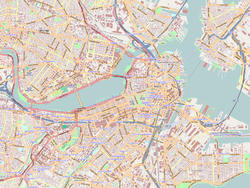Boston Young Men's Christian Union
|
Boston Young Men's Christian Union
|
|
 |
|
| Location | Boston, Massachusetts |
|---|---|
| Coordinates | 42°21′7.81″N 71°3′50.63″W / 42.3521694°N 71.0640639°WCoordinates: 42°21′7.81″N 71°3′50.63″W / 42.3521694°N 71.0640639°W |
| Built | 1875 |
| Architect | Bradlee & Winslow; Morton & Chesley |
| Architectural style | Gothic |
| MPS | Boston Theatre MRA |
| NRHP Reference # | |
| Added to NRHP | December 9, 1980 |
The Boston Young Men's Christian Union is an historic building at 48 Boylston Street in Boston, Massachusetts and a liberal Protestant youth association. When Unitarians were excluded from the Boston YMCA (which was evangelical) in 1851, a group of Harvard students founded a Christian discussion group, which was incorporated as the Boston YMCU in 1852. In 1873, the organization decided to construct its own building. $270,000 was raised, and construction on the original segment completed in 1875. The building was designed by Nathaniel Jeremiah Bradlee, constructed in a High Victorian Gothic style, and included ground-level retail. Several additions were made, including in 1956. The building was designated a Boston Landmark by the Boston Landmarks Commission in 1977 and added to the National Historic Register in 1980. Boston YMCU owned Camp Union, a 600-acre (240 ha) camp, in Greenfield, New Hampshire (1929–1993) (now Barbara C. Harris Camp & Convention Center of the Episcopal Diocese of Massachusetts). From its renovation in 2003 to 2011 it was called the Boylston Street Athletic Club, and later the Boston Union Gym or BYMCU Athletic Club.
The Massachusetts Commission for the Blind moved out in 2012, and the organization began failing financially. In 2016, plans were announced to redevelop the site as 46 units of affordable housing, in partnership with the Planning Office for Urban Affairs of the Archdiocese of Boston.
The BYMCU goal in 1852 was to furnish the young men of Boston and vicinity a place of pleasant resort where the influences are beneficial and elevating, to provide them with opportunity of self-improvement and healthful recreation, at little or no expense; to give them opportunities for doing good, by engaging in charitable and benevolent work.
...
Wikipedia



